Discover COMPRESSEDfm
COMPRESSEDfm

207 Episodes
Reverse
Web development is constantly evolving, and so are the tools we use to build. In this episode, Amy and Brad chat with the organizers of Squiggle Conf about the future of web dev tooling, how conferences shape the developer experience, and why community matters just as much as code.Chapters0:00 - Intro0:34 - Meet the Guests: Squiggle Conf OrganizersSquiggle Conf1:19 - What Makes Squiggle Conf Unique3:19 - Tooling and Developer Experience3:30 - Penguins, IMAX, and the Conference Venue4:18 - Who Should Attend Squiggle Conf5:31 - How Talks Are Selected and Curated6:51 - Social and Community Aspects of the Conference12:19 - Behind the Scenes of Organizing a Conference17:46 - Lessons Learned from Running Events23:30 - The Role of Tooling in Modern Development27:21 - Browser-Based Tools and Their Impact28:51 - Shoutout to Astro and Other FrameworksAstroStarlight - Astro's template for documentation33:51 - Comparing Different Conference Experiences38:55 - Building Momentum in the Developer Community40:45 - Looking Ahead: The Future of Squiggle Conf42:02 - Final Thoughts from the Organizers43:43 - Picks and PlugsAre the Types Wrong? — a package & CLI tool by Andrew Branch from the TypeScript teamThe Harry Potter movie seriesCloudflareOne Switch - Mac Menu Bar AppRedwoodSDK
Vue developer Alex Riviere joins Amy to explore the fundamental differences between Vue and React, diving deep into Vue's unique approach to reactivity, templating, and developer experience. From the magic of V-Model eliminating controlled/uncontrolled input complexity to Vue's proxy-based reactivity system that "just works," Alex explains why Vue's mental model clicked for him coming from jQuery. The conversation covers Vue 3's Composition API and Script Setup syntax, the evolution from VueX to Pinia for state management, and exciting developments like Vue Vapor Mode that will eliminate the virtual DOM entirely. Alex also breaks down Evan You's recent $4.6M VoidZero funding to revolutionize JavaScript build tooling, the flexibility of Nuxt as a meta-framework, and why Vue remains approachable enough to sprinkle into any project without complex build steps. Show Notes00:00 - Intro01:10 - How Alex Got Started with Vue03:00 - Vue vs React Mental Models08:00 - Vue's Approach to Forms and V-Model10:20 - Vue Frameworks: Nuxt and the Ecosystem17:00 - Vue 2 to Vue 3 Migration Challenges19:00 - Nuxt as a Dev Dependency vs Runtime22:30 - When Do You Need a Framework with Vue?25:30 - Laravel Integration and Alpine.js Connection27:40 - Vue's Reactivity System and Proxies29:40 - State Management: VueX to Pinia Evolution32:20 - SSR and Server Components in Vue34:10 - Hosting and Deployment Options35:40 - Evan You's VoidZero Funding and Vision43:10 - Vue Vapor Mode: Eliminating Virtual DOM47:40 - Getting Started with Vue Resources48:40 - Picks and Plugs Links and ResourcesPeople MentionedAlex Riviere - @alexriviereEvan You - Vue.js creator - @youyuxiBen Hong - Vue core team member - @bencodezenDaniel Roe - Nuxt team - @danielcroeTaylor Otwell - Laravel creator - @taylorotwellVue.js ResourcesVue.js Official Site - vuejs.orgVue.js Documentation - vuejs.org/guideVue School - vueschool.ioVue Mastery - vuemastery.comFrameworks & Tools MentionedNuxt - nuxt.comVite - vitejs.devAstro - astro.buildPinia (Vue state management) - pinia.vuejs.orgVueX (legacy state management) - vuex.vuejs.orgAlpine.js - alpinejs.devLaravel - laravel.comLivewire - livewire.laravel.comSolid.js - solidjs.comReact - react.devSvelte - svelte.devBuild Tools & InfrastructureESBuild - esbuild.github.ioRollup - rollupjs.orgNitroPack - nitro.unjs.ioWebpack - webpack.js.orgVoidZero (Evan You's new company) - voidzero.devHosting PlatformsNetlify - netlify.comVercel - vercel.comCloudflare - cloudflare.comReact Ecosystem (for comparison)Next.js - nextjs.orgRemix - remix.runRedwoodJS - redwoodjs.comGatsby - gatsbyjs.comPodcasts & ContentDeja Vue Podcast - dejavue.fm (mentioned Evan You VoidZero interview)Vue.js Conferences - VueConf eventsTechnical Concepts to ResearchVue Composition API - vuejs.org/guide/extras/composition-api-faq.htmlVue Script Setup - vuejs.org/api/sfc-script-setup.htmlVue Directives - vuejs.org/guide/essentials/template-syntax.html#directivesVue Reactivity - vuejs.org/guide/extras/reactivity-in-depth.htmlVue Vapor Mode (experimental) - github.com/vuejs/core-vaporJavaScript Proxies - MDN Proxy DocumentationSignals (reactive programming) - General concept in modern frameworksPicks & PlugsDropout TV - Nobody Asked - dropout.tvCodeMash Conference - codemash.orgWhoosh Screen Cleaner - https://amzn.to/4nBR5UtAdditional Helpful ResourcesVue 2 to Vue 3 Migration Guide - v3-migration.vuejs.orgVue vs React Comparison - vuejs.org/guide/extras/composition-api-faq.html#comparison-with-react-hooksIslands Architecture - jasonformat.com/islands-architecture
In this hosts-only episode, Amy and Brad get real about the developer experience - from the stress of job interviews to the complexities of choosing the right framework. They discuss why companies are comparing candidates more than ever, share strategies for answering behavioral interview questions, and debate the merits of Remix versus Next.js (spoiler: Brad's all-in on Remix). The conversation shifts to feature flags and progressive rollouts, with insights from Brad's work at Stripe. SponsorWorkOS helps you launch enterprise features like SSO and user management with ease. Thanks to the AuthKit SDK for JavaScript, your team can integrate in minutes and focus on what truly matters—building your app. Chapter Marks00:00 - Intro00:41 - Sponsor: WorkOS01:47 - Brad's Keyboard and Mouse Shopping Spree04:30 - Keyboard Layout Discussion07:23 - Apple Ecosystem: Reminders and Notes09:23 - Family Sharing and Raycast Integration09:43 - Notion vs Apple Notes for Project Management11:31 - File Storage and Backup Strategies14:00 - Machine Backup Philosophy16:46 - Job Interview Preparation Tips19:40 - Answering the "Weakness" Question21:53 - Addressing Weaknesses: Delegation Examples24:29 - Conflict Resolution Interview Questions25:46 - Company Research Before Interviews27:00 - Tech Stack Considerations: Remix vs Next.js28:30 - Framework Migration Decisions29:30 - Astro for Content Sites31:02 - Backend Languages: Go vs TypeScript32:30 - React Server Components Future34:23 - Feature Flags and Boolean as a Service35:30 - Feature Flag Segmentation and A/B Testing36:54 - PostHog and Analytics Tools38:30 - Progressive Rollouts and Error Monitoring40:20 - Amy's Picks and Plugs43:35 - Brad's Picks and Plugs
Josh Cirre joins us to discuss his transition from the JavaScript ecosystem to Laravel, revealing why PHP frameworks can offer a compelling alternative for full-stack development. We explore the "identity crisis" many frontend developers face when needing robust backend solutions, how Laravel's batteries-included approach compares to piecing together JavaScript services, and the trade-offs between serverless and traditional hosting environments. Josh also shares insights on Laravel's developer experience, front-end integration options, and his thoughts on what JavaScript frameworks could learn from Laravel's approach to abstraction and infrastructure.Show Notes0:00 - Intro1:02 - Sponsor: Wix Studio1:46 - Introduction to Laravel2:25 - Josh's Journey from Frontend to Backend5:40 - Building the Same Project Across Frameworks6:32 - Josh's Breakthrough with Laravel8:20 - Laravel's Frontend Options10:25 - React Server Components Comparison12:00 - Livewire and Volt13:41 - Josh's Course on Laracasts14:08 - Laravel's DX and Ecosystem16:46 - MVC Structure Explained for JavaScript Developers18:25 - Type Safety Between PHP and JavaScript21:12 - Laravel Pain Points and Criticisms22:40 - Laravel Team's Response to Feedback24:50 - Laravel's Limitations and Use Cases26:10 - Laravel's Developer Products27:20 - Option Paralysis in Laravel30:46 - Laravel's Driver System33:14 - Web Dev Challenge Experience33:38 - TanStack Start Exploration34:50 - Server Functions in TanStack37:38 - Infrastructure Agnostic Development41:02 - Serverless vs. Serverful Cost Comparison44:50 - JavaScript Framework Evolution46:46 - Framework Ecosystems Comparison48:25 - Picks and Plugs Links Mentioned in the EpisodeLaravel - PHP frameworkTanStack Start - React meta-framework Josh created a YouTube video aboutLivewire - Laravel's HTML-over-the-wire front-end frameworkInertia.js - Framework for creating single-page appsVolt - Single file component system for LivewireLaravel Cloud - Managed hosting solution for Laravel applicationsHerd - Laravel's tool for setting up PHP development environmentsForge - Laravel's server management toolEnvoyer - Laravel's zero-downtime deployment toolLaracasts - Where Josh has a course on LivewireJosh Cirre's YouTube channelHTMX - Frontend library Josh compared to LivewireWeb Dev Challenge with Jason Lengstorf (featuring Josh and Amy)Josh Cirre's BlueSky account (@joshcirre)Amy's BlueSky accountBrad's BlueSky account Additional ResourcesLaravel DocumentationSvelte's new starter kit (mentioned as a good example)Nightwatch - Latest product from LaravelLaravel Vapor - Serverless deployment platform for LaravelTheo's Laravel exploration (discussed in the criticism section)Laravel BreezeLaravel JetstreamLaravel Fortify (authentication package mentioned)Adonis.js (JavaScript framework compared to Laravel)Anker USB powered hub (Josh's pick)Grether's Sugar Free Black Currant Pastilles (Josh's pick)JBL Portable Speaker (Amy's pick)
In this episode, Amy and Brad dive into the ongoing debate between Laravel and full stack JavaScript frameworks. They explore both ecosystems from their unique perspectives. Amy shares her real-world experience building a project in Laravel after working extensively with JavaScript frameworks, highlighting where each approach shines and struggles. From Laravel's backend prowess to the cognitive load of context switching between languages, this episode offers practical insights for developers weighing these technology choices.Show Notes00:00 - Intro01:00 - Sponsorship: Sanity01:59 - Origins of the Laravel vs JavaScript Discussion03:59 - Amy's Experience Building a Project in Laravel06:59 - PHP Development and Linting Experience11:59 - Understanding MVC Architecture15:00 - Challenges with JavaScript Backend Services18:00 - Backend Strengths of Laravel20:00 - Frontend Challenges in Laravel23:00 - Comparing Laravel and JavaScript Ecosystem Solutions26:59 - JavaScript Full Stack Frameworks Discussion30:00 - Architectural Differences Between Frameworks33:00 - Framework Choice Considerations38:59 - Picks and Plugs: Newsletter and Cameras42:00 - Picks and Plugs: Games and YouTube Links and ResourcesSanity.io (sponsor)LaravelSam's podcast: Frontend FirstRedwoodJSRemixNext.jsAstroSupabaseInngestResend (email service)Postmark (email service)OpenAIPrismaPHP StormLaravel Blade (templating language)Laravel LivewireAlpine.jsLaravel BreezeLaravel Eloquent ORMAdonis/AdonisJSEpisode 54: Why RedwoodJS is the App Framework for Startups, with David PriceViteStorybookAmy's newsletter: Broken CombInsta360 X2 cameraInsta360 Go 3 cameraStardew Valley (game)Brad's YouTube channelCloudinary channel and Dev Hints series
Join Amy, Brad, and special guest Ryan Chenkie as they unpack Prisma's expanding ecosystem of database tools. Ryan explains why Prisma launched their own hosted Postgres service and what sets it apart from competitors in the space. The trio examines Prisma's comprehensive feature set including Accelerate for connection pooling, Pulse for real-time events, and optimization tools that help identify performance bottlenecks. They also discuss the upcoming transition from Rust to TypeScript for Prisma's core engine, making it lighter and faster. If you've been curious about modern approaches to database management or wondering which ORM is right for your next project, this conversation provides practical insights and expert perspectives.Show Notes0:00 - Intro1:12 - Working with Prisma and Supabase2:29 - Prisma Postgres Introduction4:17 - Why Choose Postgres6:36 - Prisma's Database Adapter Flexibility8:14 - Serverless Database Architecture11:13 - Connection Pooling with Accelerate14:13 - Pulse for Real-time Database Events16:54 - Studio Integration in Prisma Console18:01 - Database Optimization Tools20:00 - Benefits of Prisma Schema Language22:10 - Prisma Schema vs SQL Definitions23:01 - Comparing Prisma and Drizzle26:24 - Future Improvements to Prisma28:52 - Ryan's History with Prisma32:05 - Learning Resources for Prisma33:37 - Picks and PlugsLinks and ResourcesPrisma ResourcesPrisma WebsitePrisma Twitter/XPrisma YouTube ChannelPrisma Postgres DocumentationPrisma ConsolePrisma VS Code ExtensionPrisma AcceleratePrisma PulsePrisma OptimizePrisma StudioRyan Chenkie ResourcesRyan's Website: https://holodeck.runRyan's YouTube Channel: https://youtube.com/@holodeck_runRyan on Twitter/XFramework and Technologies MentionedRemixRedwood JSSupabasePlanetScaleDrizzle ORMPostgresMySQLMongoDBBrad's ResourcesYouTube Channel: https://youtube.com/@bradgarropyRemix Starter: https://github.com/bradgarropy/remix-appAmy's ResourcesBuild12 Projects: https://buildtwelve.comOther Resources MentionedSkylight FrameAura FrameNetflix Show: "Making Fun"Netflix Show: "Is It Cake"
Join us as we talk with Nir Sadeh, Head of Product at Wix Studio, about the platform designed specifically for web professionals. Nir breaks down how Wix Studio differs from the traditional Wix editor by offering advanced capabilities for agencies and freelancers. Learn about their newest feature—AI-powered visual sitemaps and wireframes—that helps designers quickly create site structures and get client approval. We also explore how Wix balances no-code solutions with developer flexibility, their approach to responsive design using AI, and opportunities in the Wix app marketplace. Nir shares valuable insights about product development, user research methods, and his perspective on the impact of AI on the future of web design.Show Notes00:00 - Intro01:00 - Journey to becoming Head of Product01:48 - Transition from individual contributor to manager02:21 - Team structure at Wix03:42 - Goal setting and KPIs04:36 - Overview of Wix Studio06:08 - Web-based application functionality07:03 - Code editing experiences in Wix Studio08:07 - Client control and access capabilities09:02 - New features: Visual sitemap and wireframes10:57 - AI integration points in Wix12:35 - AI generating layouts and websites14:50 - Upcoming roadmap items15:54 - User creativity surprises16:12 - Wix app marketplace17:34 - Design trends and components18:59 - User research approach20:57 - Data-driven decision making22:16 - Balancing user preferences with brand goals24:02 - Career advice for aspiring product managers25:40 - Balancing customization and consistency26:44 - Mobile responsiveness and browser support28:06 - Native apps and business management28:37 - SEO tracking and analytics29:45 - Picks and PlugsLinks and ResourcesWix Studio - The professional website creation platform discussed throughout the episodeVelo by Wix - The robust code solution mentioned at 06:45Visual Sitemap and Wireframes - The new AI feature launched by Wix StudioWix App Market - The marketplace where developers can build and sell appsVS Code integration with Wix StudioWix Studio AI Assistant - Mentioned as a coding help featureFigma to Wix - Mentioned as having import capabilities to Wix StudioPicks:Severance (TV Show) - Nir's pickRemix Dev Tools (becoming React Router DevTools) - Brad's pickAeroPress - Amy's previous pick (referenced)Prismo filter - Amy's previous pick (referenced)Milk frother - Amy's current pick
Josh Goldberg joins Amy and Brad to unpack the recent ESLint V9 release and its impact on the TypeScript ecosystem. From explaining the nuances of flat config migration to debating the proper separation between Prettier and ESLint, Josh offers practical advice for improving developer workflows. The conversation covers Josh's journey as a full-time open source maintainer, the Open Source Pledge initiative, and best practices for implementing linting in CI/CD pipelines. Plus, Josh shares behind-the-scenes details from the inaugural SquiggleConf event.Chapter Marks00:00 - Intro00:48 - Welcome Josh Goldberg01:06 - Working in open source and getting paid03:10 - The Open Source Pledge04:49 - ESLint V9 and flat config changes07:25 - Migration challenges with flat config09:52 - Understanding ESLint config format11:50 - How most people use ESLint16:20 - Prettier vs ESLint responsibilities18:47 - Conflict between Prettier and ESLint21:26 - TypeScript's role in ESLint25:01 - TypeScript ESLint packages explained27:43 - Linters for other languages29:31 - ESLint in CI/CD pipelines32:03 - Auto-fixing in different environments37:14 - AI's role in linting and formatting41:45 - SquiggleConf discussion44:15 - Conference tooling and Q&A system46:33 - Future SquiggleConf plans47:13 - Picks and PlugsBrad GarropyPick: Philips Hue smart lighting system - Set up Christmas lights with Hue smart outlets for easy control via phone or voice commandsPlug: Brad's BlueSky account - @bradgarropy.comJosh GoldbergPick: BlueSky social network - Appreciates how it feels like early Twitter without spam bots and complicated server setupsPlug: SquiggleConf - Web development tooling conference returning in September 2025Amy DuttonPick: The Inheritance Games (book) - Describes it as an easy-to-read young adult fiction with puzzles, similar to Knives OutPlug: Amy's BlueSky account - @selfteachmeLinksMentioned in the EpisodeTypeScript ESLintESLint v9 migration docsESLint Config InspectorSentry Grave $750k to Open Source MaintainersOpen Source Pledge initiativeSquiggle Conf websitePrisma PulsePhilips Hue smart lightingThe Inheritance Games (book mentioned by Amy)Social Media AccountsBrad's BlueSky account: @bradgarropy.comAmy's BlueSky account: @selfteachmeJosh Goldberg's BlueSky Account: @joshuakgoldberg.comRelated ResourcesESLint Stylistic projectESLint Config PrettierESLint Plugin Prettier"Create TypeScript Apps" project (Josh's tooling package)Awesome ESLint repo (collection of ESLint plugins)Manual to Magical: AI in Developer Tooling: Tobbe's talk on using AI to write code modsNicholas Zakas discussing the ESLint config system on Syntax podcastTools MentionedHuskyLint-stagedCursorBiome and OXLint (Rust-based linters)GitHub Actions
Join us for an insightful conversation with Dani Grant, co-founder of Jam.dev, as she shares her journey from Cloudflare PM to startup founder. Learn how Jam.dev persevered through eight failed attempts before finding product-market fit and growing to 85,000 users. Dani reveals valuable lessons about product-led growth, building in public, and raising venture capital. From tactical fundraising tips to creative community building strategies like jam.pizza, this episode is packed with practical insights for founders and anyone interested in the startup journey. SponsorConvex is the backend for founders. Convex is the backend application platform for product-obsessed founders. Show Notes0:00 - Intro0:29 - Sponsor: Convex1:08 - Meeting Dani Grant1:41 - Early Career at Cloudflare3:09 - Finding Internships & Career Growth5:25 - Starting Jam.dev11:56 - Product Evolution & User Growth16:57 - Product Features & Implementation21:22 - Monetization Strategy23:37 - Technical Deep Dive: How Jam Works27:49 - Future Plans & Mobile Development29:12 - Fundraising Tips & Strategies34:00 - Supporting Developer Communities36:18 - Picks and Plugs LinksCompanies/Products:Jam.devCloudflareConvex (sponsor)SentryData DogHotjarFullStoryJIRAMetabaseNotionSocial/Personal:Dani Grant's TwitterDani Grant's email (dani@jam.dev)Brad Garropy's Twitter (@bradgarropy)Learn Build Teach DiscordDeals for Devs projectBooks/Media:"Tomorrow and Tomorrow and Tomorrow" (book mentioned by Dani)Matt Wolf's YouTube channel (AI recaps)Career Resources:jam.dev/careers (mentioned they're hiring)jam.pizza (community meetup sponsorship form)Technical Tools Mentioned:ViteRemixES BuildProducts Similar to Jam:FullStoryHotjarSentryDatadogDevelopment Tools:Chrome Extension Store (where Jam is available)Community:LearnBuildTeach.comDeals for Devs
Join us as Tanner Linsley, the creator and founder of TanStack Start talks about its transition from Vinci to a more streamlined architecture built on Nitro. Learn about the framework's innovative approach to server functions, its isomorphic design philosophy, and how it differs from other frameworks like Remix. Tanner also shares insights into TanStack's sustainable open-source business model and his journey to building developer tools that prioritize user experience over rapid growth.Show Notes0:00 - Intro0:38 - Welcome Tanner Linsley3:43 - React Server Components and TanStack Evolution6:04 - TanStack Start Overview and Vinci Transition11:26 - Nitro Integration and Framework Architecture15:19 - Server Functions and Framework Comparisons20:58 - API Design Philosophy24:19 - Testing and Development Process30:58 - Team and Collaboration Discussion33:38 - Open Source Sponsorship Strategy36:32 - Netlify Partnership Announcement38:37 - Open Source Sustainability Discussion41:03 - Picks and Plugs LinksProducts & Tools:TanStackVinxi by Nikhil SarafNitroReact RouterTRPCRemixH3 (web request library)XPro (Tweet Deck)Deck.blue (BlueSky client)MOTU M4 audio interfaceBamboo Lab A1 3D printerLashbrook Designs (Brad's wedding band)Companies & Sponsors:ConvexClerkAG GridSentryNetlifyGames & Entertainment:Blockus (board game)Severance (TV Show on Apple TV+)"First Lie Wins" (book)Personal Projects & Links:buildtwelve.com (Amy's project)Brad on BlueSky (@bradgaropy.com)Nozzle (Tanner's startup)Technical Resources:Babel Dead Code Elimination (by Pedro Katori)GitHub 3D Contribution Graph GeneratorReact Server Components documentationOther Projects Mentioned:Solid StartAstro
Brooks Lybrand discusses the transformation of React Router from a simple routing library to a powerful framework option for React applications. Learn about React Router 7's new framework mode, upcoming middleware support, and the team's innovative approach to React Server Components. Brooks explains how the Remix team is working to bring proven patterns and web standards to the broader React community while building a foundation for future web development that leverages native web APIs.Chapter Marks0:00 - Intro0:37 - Guest Introduction & SNL Jacket Discussion1:12 - The Remix "Nap" Announcement3:25 - Understanding React Router's Evolution7:51 - React Router Framework Mode10:21 - Middleware Support Plans15:42 - React Server Components Integration19:14 - Server-Side Capabilities & RSC Benefits24:17 - Team Size and Structure25:13 - Remix Brand & Future Direction30:19 - Future of Web APIs32:03 - Austin Remix Meetup Discussion34:54 - Community Engagement and Open Source36:19 - Picks and Plugs LinksPeople & Profiles:Brooks Lybrand's social profilesTwitterBlueSkyMichael ChanJames PerkinsRyan FlorenceEvan Bacon (mentioned for RSC mobile demo)Tools & Projects:React Router 7Remix RunRemix DiscordVite 6Cursor AI (mentioned in Amy's pick)The dev.to article about Cursor settings that Amy referencedElgato XLR Deck (Brad's pick)OXO Silicon Measuring Cup (Amy's pick)Events & Communities:Epic Web Conf (March 2024, where Brooks will be speaking)React Miami (April 2024, where Brooks will be speaking)Remix Austin MeetupTechnical Resources:React Server Components documentationRemix Project RoadmapVite's Environment API documentationBooks:The Three-Body Problem book series (Brooks' pick)Additional Resources:Netflix's Three-Body Problem show (mentioned in relation to Brooks' pick)
Join us for an insightful conversation with Ceora Ford about the intersection of security, development, and community building. We explore why managing identity security is more complex than simple authentication, examine the trade-offs of Next.js's App Router in enterprise applications, and uncover strategies for effective technical content creation. Ceora shares her experience transitioning from digital marketing to developer advocacy, offering practical advice for building a presence across platforms like TikTok, Twitter, and LinkedIn.SponsorConvex is the backend for founders. Convex is the backend application platform for product-obsessed founders.Chapter Marks00:00 - Intro01:14 - Identity Security Discussion05:25 - Evolution of React and Next.js08:33 - Documentation and Developer Experience15:43 - Sponsor: [Convex](https://convex.dev)16:20 - Authentication in the App Router21:31 - Content Creation and Marketing Strategy27:50 - Social Media Platform Strategy34:51 - Analytics and Tool Discussion41:08 - Picks and PlugsBradPick: His dog Roman (who they had to say goodbye to at age 17)Plug: Social media accountsBrad on TwitterBrad on BlueSkyBrad on YouTubeBekahPick: "The Game" podcast with Alex HormoziPlug: Open Sauce (opensauced.pizza) and her team's upcoming feature launchCeoraPick: "The Good Place" (TV show on Netflix)Plug: Social media accountsCeora on LinkedInCeora on TwitterCeora on BlueSkyCeora on TikTokLinksAuth0 by OktaNext.jsAuth0 documentation for Next.js integrationGatsbyAstroConvexJekyllGraphQLOpen SaucedMark Techson
In this episode of Compressed FM, Dustin Goodman shares insights from his journey from IC to engineering manager at companies like ClickUp and This Dot. The conversation explores the nuances of technical leadership, team dynamics, and the importance of understanding personal values in management. The discussion then shifts to a deep dive into React Server Components, examining their implementation challenges and potential impact on the framework ecosystem. SponsorsWix Studio combines the best of both worlds—intuitive design tools for clients and full-stack flexibility for developers. Customize every detail with your own code and take control of your projects.Chapter Marks00:00:00 - Intro00:00:42 - Sponsor: Wix Studio00:01:33 - Engineering Management Journey00:05:11 - Managing Different Experience Levels00:07:14 - Technical Skills in Management00:09:27 - Should Managers Code?00:12:19 - Managing Up vs Managing Down00:17:27 - Team Values Discussion00:20:11 - Strengths and Management Styles00:26:07 - React Server Components Introduction00:29:27 - RSC Implementation Challenges00:34:34 - GraphQL and Server Components00:39:13 - Future of React Frameworks00:43:10 - Vite 6 Discussion00:47:52 - React Community Evolution00:51:21 - Picks and PlugsAmy Dutton:Pick: Browse AI (web scraping tool with AI capabilities)Plug: Advent of CSS and Advent of JavaScript (24 coding challenges in December)Dustin Goodman:Pick: Cursor (AI-powered code editor)Plug: "Engineering Management for the Rest of Us" by Sarah DrasnerBrad Garropy:Pick: Helldivers 2 (video game)Plug: Raycast extension for Stripe (automatically fills checkouts with test cards)01:00:14 - Show Wrap-upLinksBooks Mentioned:"The Manager's Path" by Camille Fournier"Engineering Management for the Rest of Us" by Sarah DrasnerTools & Software:Wix StudioBrowse AICursor (code editor)RaycastRaycast Stripe extensionVite 6Next.jsSocial/Community:BlueSky (Brad and Amy)Bytes NewsletterConnectTech conferencePeople Referenced:Ryan BurgessGergely OroszTracy LeeDan AbramovTanner LindsleyJohn LindquistDavid KhourshidAssessment Tools:Clifton StrengthsFinderAPIs/Documentation:Stripe test cards documentationReact Server Components documentationVite documentationProjects:Advent of CSS (adventofcss.com)Advent of JavaScript (adventofjs.com)
Brad and Amy dive into their year-end tech reflections, discussing goal-setting strategies and Amy's ambitious Build 12 project for 2025. The hosts explore various database hosting solutions, share their favorite hardware purchases including cameras and peripherals, and examine how AI tools are reshaping development workflows. The episode concludes with insights into emerging tech trends and anticipated developments for 2025.Chapter Marks00:00 Episode introduction and host intros00:41 Year-end goals discussion and 12-week planning02:02 Amy's Build 12 project announcement03:01 Goal setting strategies and focus04:25 Brad's 2024 goals review05:35 Travel plans and New York City trips06:58 More 2024 goals: fitness, career, and finances08:21 Technical stack discussion13:22 AI tools and development workflows17:19 Database hosting options comparison25:45 Tech gear and hardware updates33:47 Notable tech purchases review43:29 AI tools and future tech discussionLinksBuild Twelve, by Brian P. Moran - Amy's upcoming projectThe 12 Week Year (book)Atomic Habits, by James Clear (book)The Power of Habit, by Charles Duhigg (book)SupabaseNeon databaseDigital OceanTursoCursor IDERemarkable Tablet (v2)Oura RingRazer Basilisk V3 Pro mouseSwish app for MacNuphy Air 75 keyboardDrop keyboardInsta360 One cameraInsta360 Go 3 cameraNikon ZFC cameraRay Deck - Episode 182: Low-Code as a Medium For High-Speed DevelopersMarc LouPieter LevelsWorkOSThe Best Way to Add Authentication to Your Astro Website (Amy’s YouTube Video)Comparing Frameworks - Amy's projectGitHub CopilotClaudeconvertkit.comloops.soPrisma
In this episode, we dive deep into the dynamics of working solo versus being part of a development team. From the ideal team composition at large companies to the challenges of maintaining open source projects, our hosts share their experiences and insights. Learn about the crucial roles of designers and product managers, the importance of documentation, and why even senior developers still Google Git commands. Whether you're a solo developer looking to collaborate or a team player wanting to improve your workflow, this episode has something for everyone. Chapter Marks00:00 - Introduction01:16 - The Perfect Team Composition02:44 - Different Approaches to Team Building04:37 - Working Without Designers: The FedEx Experience08:10 - Documentation and Project Requirements12:30 - The Role of Documentation in Team Success14:47 - Documentation's Impact on Career Growth15:14 - Onboarding and Documentation Connection16:51 - Open Source Project Management19:45 - Automation in Open Source22:34 - Deals for Devs: Managing Contributors25:29 - Branch Management and PR Workflows29:59 - Solo Development Practices31:21 - Git Commands and Team Workflows35:14 - Open Source Knowledge Barriers38:02 - The Importance of Admitting What You Don't Know39:15 - Episode Wrap-up LinksNick Taylor's Blog Post about GitHub Code Owners - https://dev.to/opensauced/supercharge-your-repository-with-code-owners-4clgB Dougie's GitHub Action for the "Take" command - https://github.com/bdougie/take-action/blob/main/action.ymlChantastic's Git Course on Epic Web - https://www.epicweb.dev/tutorials/git-fundamentalsGitHub Documentation on Squash Merging vs Rebase Merging - https://docs.github.com/en/pull-requests/collaborating-with-pull-requests/incorporating-changes-from-a-pull-request/about-pull-request-mergesMerge vs Rebase vs Squash - https://gist.github.com/mitchellh/319019b1b8aac9110fcfb1862e0c97fbGitHub Issue Forms Documentation - https://docs.github.com/en/communities/using-templates-to-encourage-useful-issues-and-pull-requests/syntax-for-issue-formsGitHub Pull Request Templates Guide - https://docs.github.com/en/communities/using-templates-to-encourage-useful-issues-and-pull-requests/creating-a-pull-request-template-for-your-repositoryGitHub Code Owners Documentation - https://docs.github.com/en/repositories/managing-your-repositorys-settings-and-features/customizing-your-repository/about-code-ownersVirtual Coffee's Hacktoberfest Resources - https://hacktoberfest.virtualcoffee.io/OpenSauce - https://opensauced.pizza/The "Working Genius" Assessment - https://www.workinggenius.com/Gun.io Work Personality Quiz - https://gun.io/workstyle/Deals for Devs Project - https://www.dealsfordevs.com/GitHub Actions Documentation on Release Management - https://docs.github.com/en/actions/sharing-automations/creating-actions/releasing-and-maintaining-actionsConventional Commits Documentation - https://www.conventionalcommits.org/en/v1.0.0/
Join Amy and Brad as they break down the latest developments in the React ecosystem following React Conf 2024. From quality-of-life improvements in React 19 to the introduction of the new React compiler, they analyze how these changes will impact everyday development. The episode features an in-depth discussion about Remix's strategic decision to focus on React Router, the ongoing debate between JavaScript frameworks and traditional backend frameworks, and thoughtful insights into choosing the right tools for your projects. Whether you're a seasoned React developer or just getting started, this episode offers valuable perspective on the future of web development.SponsorsSanity delivers content anywhere (just like a headless CMS).Beyond that, Sanity gives you total composability. A fully decoupled, real-time content back end. Entirely customizable content workspaces.Chapters00:00 - Introduction00:42 - Sponsor: Sanity02:12 - React Conf Experience05:00 - Conference Personalities08:52 - React Compiler Deep Dive13:20 - Remix "Taking a Nap" Discussion26:41 - React 19 Features33:54 - JavaScript vs PHP/Laravel Debate41:11 - Framework Decision Fatigue44:45 - Picks & Plugs
In this host-only episode of Compressed FM, James Q Quick, Amy Dutton, and Bekah discuss how side projects and creative outlets can paradoxically provide energy rather than drain it. The conversation explores Bekah's ambitious 29-day writing project about open source alternatives, Amy's vlogging journey, and James's streaming experiences. They dive into the importance of finding activities that spark joy, even when juggling busy schedules and family commitments. The hosts share insights about automation tools like PipeDream, discuss the value of downtime for creativity, and emphasize the importance of sustainable work practices in tech.SponsorConvex is the backend for founders. Convex is the backend application platform for product-obsessed founders.Chapters00:00:00 Introduction & Welcome00:00:39 Bekah's Open Source Writing Project00:02:05 Discussion of PipeDream vs Zapier00:05:14 Content Creation Process & AI Tools00:08:22 Time Management in Content Creation00:10:31 Flexible Work Schedules00:11:31 Amy's Vlogging Journey00:14:48 Creative Energy & Side Projects00:16:47 Work-Life Balance & Productivity00:18:20 Importance of Downtime for Creativity00:20:34 Efficiency in Daily Life00:22:02 Sponsor: Convex00:22:49 Deals for Dev Project Discussion00:25:40 Picks and Plugs Segment
In this episode, Chris Sev discusses building SaaS projects with Laravel and AI, detailing his journey from launching Scotch.io to creating VideoTap. Dive into the innovative workflows for automating video marketing content, learn why Laravel remains his go-to framework, and explore insights on the future of AI in development.Show Notes00:00:00 - Intro00:00:33 - Guest Introduction: Chris Sev, DevRel at Sourcegraph00:01:08 - Chris's Background and Journey00:02:28 - Tech Stack Behind Video Tap00:02:55 - Story of Getting the VideoTap.com Domain00:05:20 - VideoTap's AI Implementation and Process00:14:20 - How VideoTap Uses AI for Content Generation00:17:06 - Prompt Engineering Tips and Techniques00:21:17 - AI Content Generation Pipeline and Error Handling00:22:27 - Handling Large Videos and Context Windows00:23:44 - Experimenting with Different AI Models00:24:23 - AI Writing Style and Evaluation Techniques00:27:44 - Current State of VideoTap: Team and Revenue00:30:39 - Future Goals: Integrations and Features00:35:27 - Chris's Work at Sourcegraph and Mission00:38:20 - Picks and PlugsAmyPick: Polar HabitsPlug: Broken Comb NewsletterChrisPick: Phind.com and Perplexity.aiPlug: TwinPicks.ai, Richest You SubstackJamesPick: Kroser TSA Travel Laptop BackpackPlug: NewsletterLinksVideoTapAnthropic Prompt Engineering GuideCreator Hooks NewsletterThumbnail TestCodi AI Coding Assistant
In this episode, Amy, Brad, and guest Alex dive into cutting-edge CSS features that are transforming web development. They explore container queries, logical properties, CSS layers, and scopes, sharing practical applications and browser support updates. The trio also discusses Tailwind CSS and its role in modern web design, offering spicy takes on its implementation.SponsorWix Studio combines the best of both worlds—intuitive design tools for clients and full-stack flexibility for developers. Customize every detail with your own code and take control of your projects.Show Notes00:00 - Welcome and Introductions01:16 - Shoutout to Wix Studio03:12 - CSS as a Typed Language04:10 - The Magic of CSS Layers07:38 - Logical Properties and Global Support10:47 - Browser Wars: Who's Leading in CSS?20:24 - Container Queries in Action25:37 - CSS Scopes and Their Potential28:03 - Revolutionizing CSS: Style Queries and Beyond36:12 - Tailwind CSS: A Spicy Debate46:13 - Picks and PlugsAlex's Pick: Dropout.tv, especially Gastronauts.Alex's Plug: Speaking at Connect Tech (Atlanta) and Codemash (Ohio). Socials: @fimion (Twitter), @DangitAlex.wtf (Blue Sky)Brad's Pick: Love is Blind season and reunion episodes.Brad's Plug: New to Blue SkyAmy's Pick: Happy Little Dinosaurs board gameAmy's Plug: Freaking Full Stack workshopLinksRaindrop.ioInterop 2025 ListTailwindCSS
In this episode, Chris Nowicki shares his path from aerospace to web development and the unique challenges of transitioning into tech. Chris and James discuss how Chris got involved in the open-source project "Deals for Devs," including the tech stack, managing contributions, and handling obstacles. This episode offers a first-hand look at the value of community in development and tips for new devs on getting started in open source.SponsorPostman is an API platform for building and using APIs. Postman simplifies each step of the API lifecycle and streamlines collaboration so you can create better APIs—faster.Show Notes00:00 - Intro01:08 - Chris Nowicki’s Journey into Tech02:12 - Bootcamp Experience and Structure05:07 - Breaking into Tech Through Community Involvement08:38 - Deals for Devs: The Project Origin11:10 - Sponsor Message: Postman12:06 - Tech Stack Overview for Deals for Devs13:22 - Tech Stack: Resend, React Email, Tailwind, and Xata17:00 - Prisma Integration with Xata20:00 - Challenges in Managing Community Projects23:54 - Planning and Issue Management for Deals for Devs28:00 - Feature Flags and Release Management37:15 - Subscription System Workflow45:45 - Creating a Dynamic Email Subscription System51:58 - Managing Admin and Approval for Deals52:26 - ClosingLinksOpenSaucedRedwoodJSDeals for Devs ProjectPostmanReact EmailVercelXataResendFrontend MentorLaunchDarklyGrid Iron SurvivorDev.to article on CRON jobs


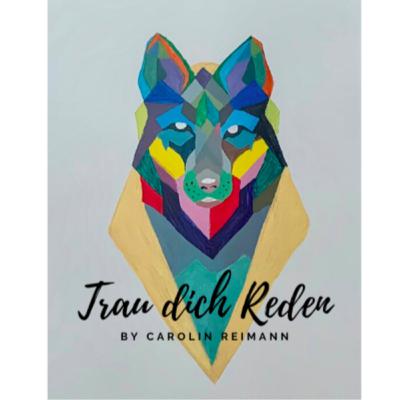

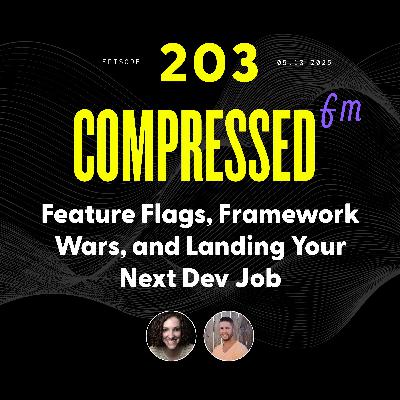
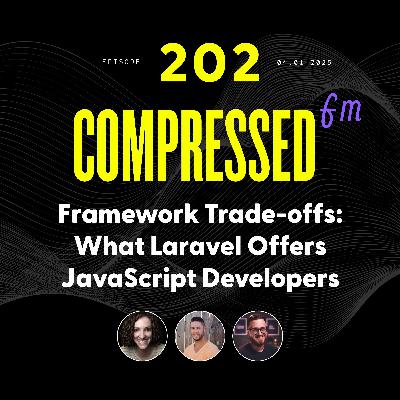
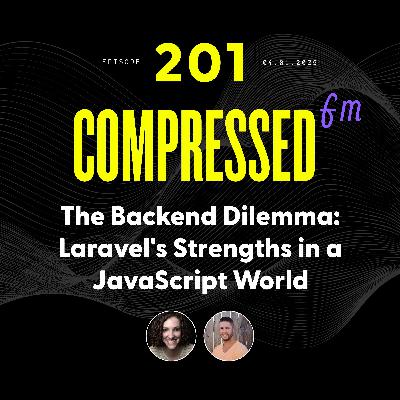
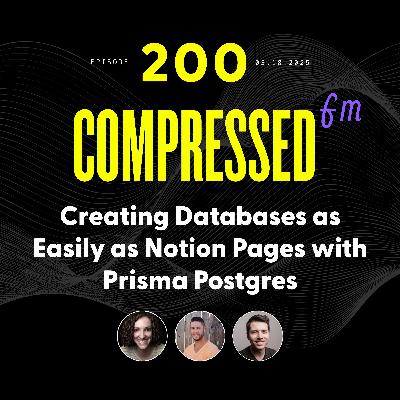
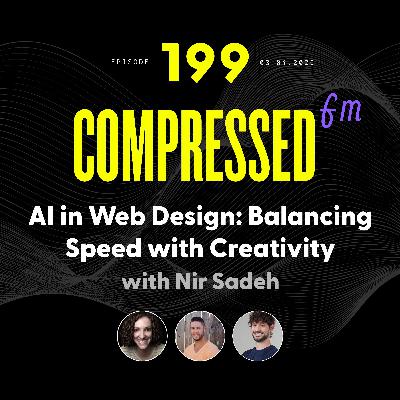
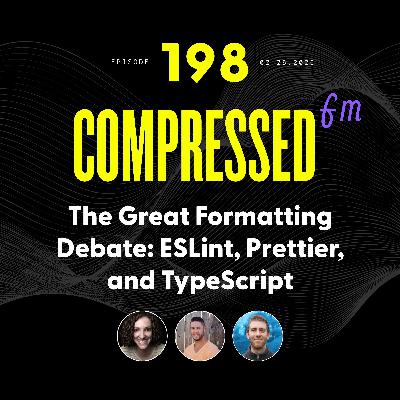




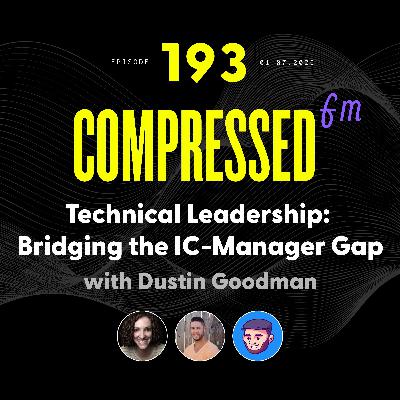










Thank you so much for this episode. It helped me focus on my own developer experience.